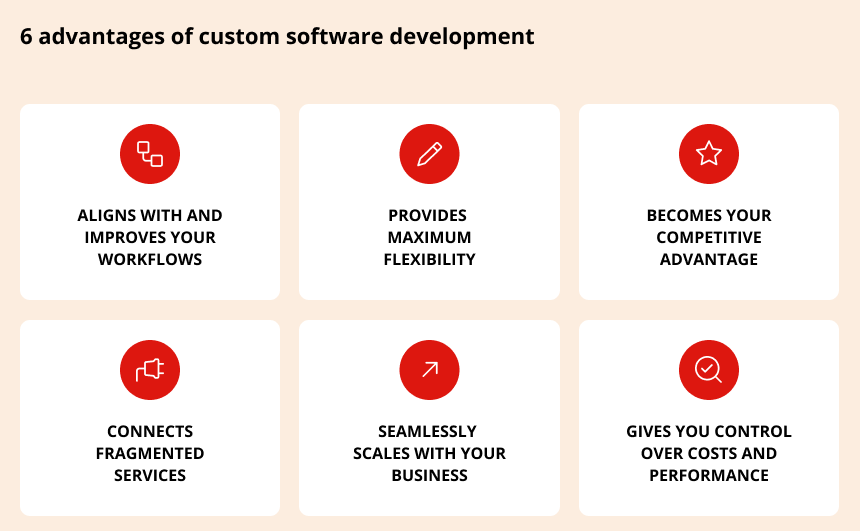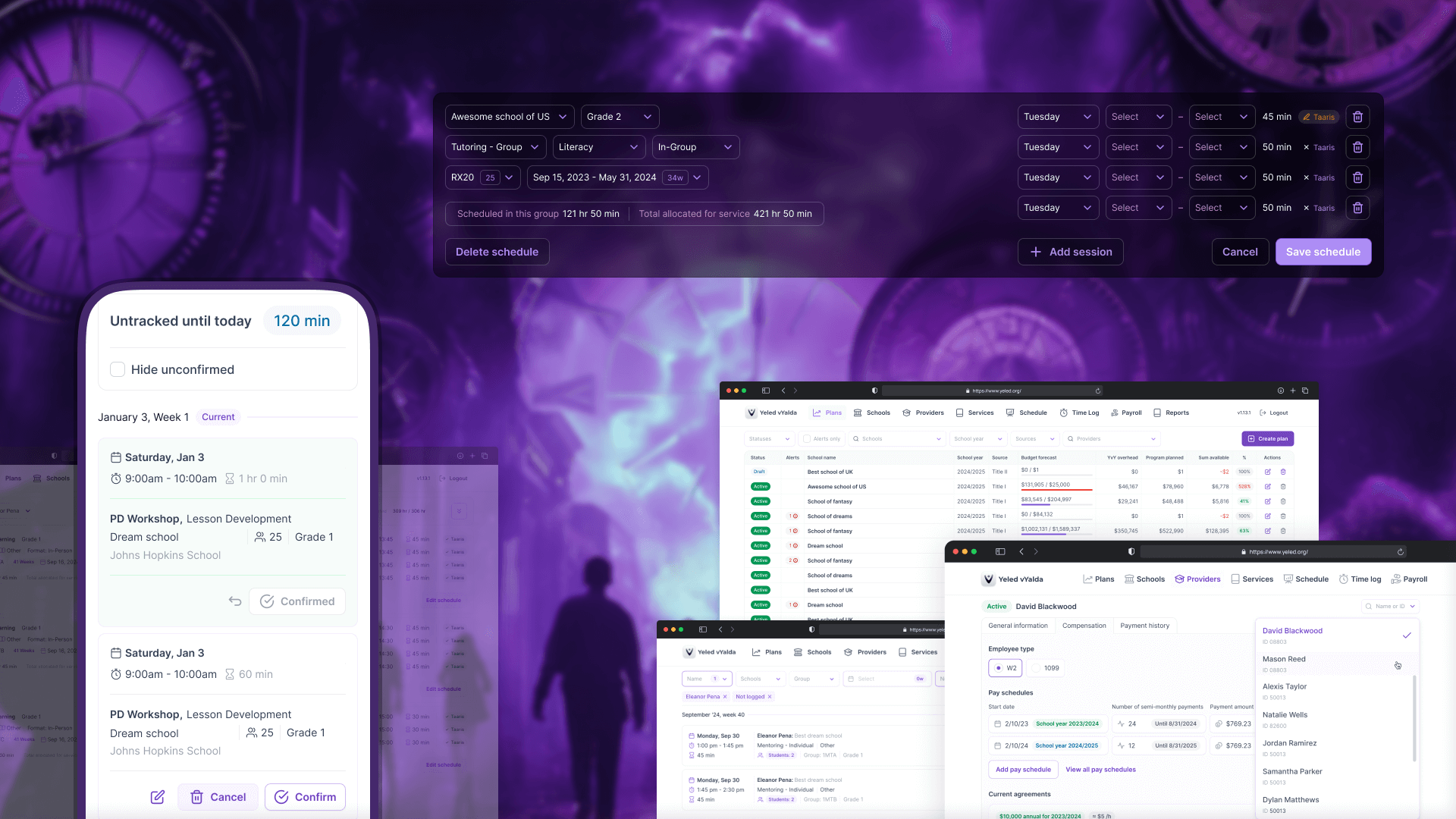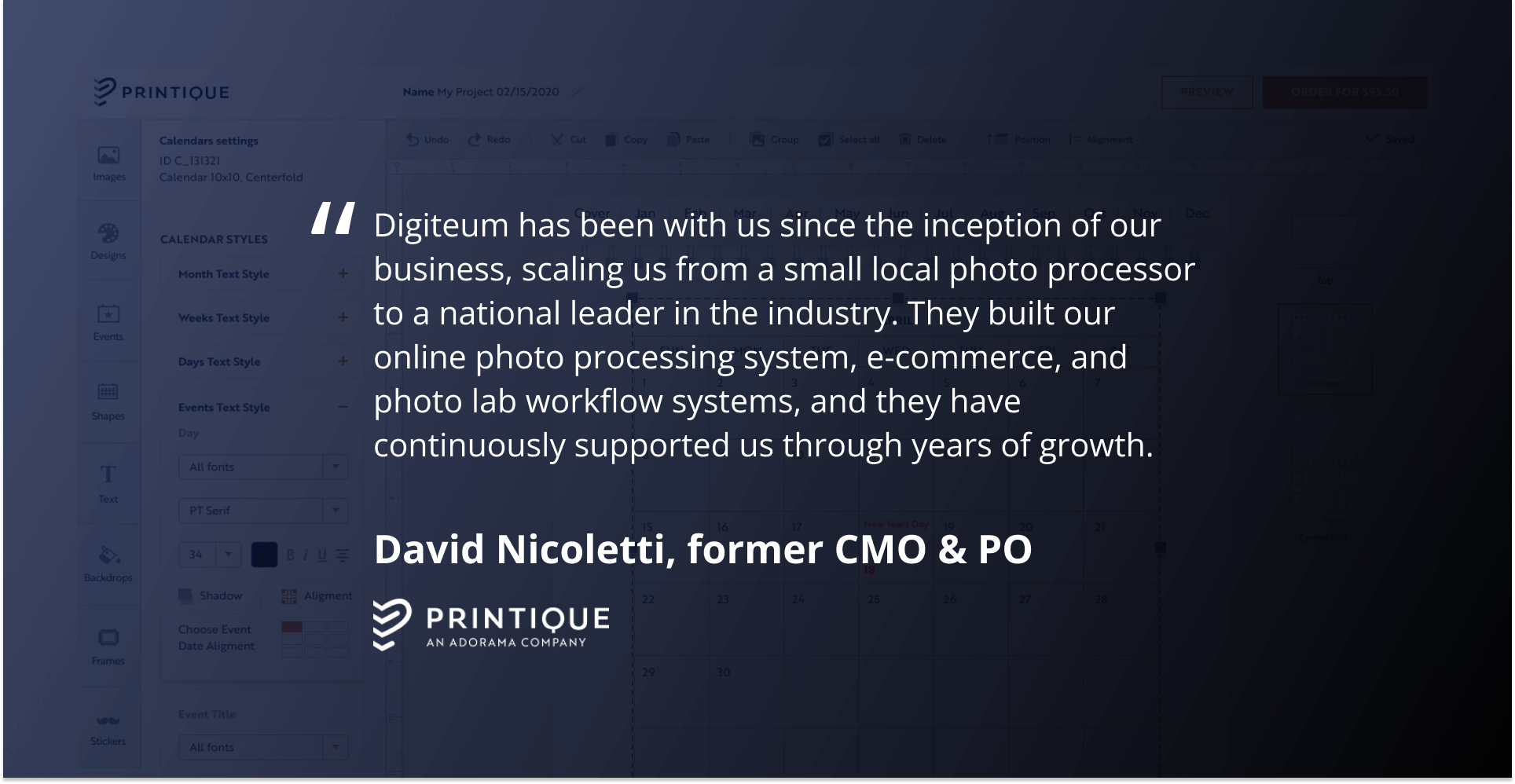6 Advantages of Custom Software Development
Build or buy? In many cases, the benefits of custom software development justify the cost providing companies with flexibility and competitive advantage. But it doesn’t mean that everyone needs custom-built software.
If you are weighing the pros and cons trying to figure out whether to build software from scratch or go for an out-of-the-box product, make yourself comfortable and read on. We will walk you through the common and uncommon advantages of custom software and give 5 business use cases that prove its worth. With real-world examples, of course.
Off-the-shelf software solves standard challenges of a specific industry, niche, or category of users. Think of an inventory management SaaS for logistics of customer support apps for eCommerce. Standard tasks — standard solutions.
Custom software, on the other hand, addresses the unique needs of your business and your customers. It is perfectly tailored to your requirements. Assuming that it’s designed and built right.
This is the most important difference between the two, but there are more.
Let’s quickly recap the key characteristics of custom and ready-made software. Later, you will see how these characteristics translate into the benefits of custom software and impact your choice.
| Off-the-shelf | Custom | |
|---|---|---|
| Time to market | Instant | 3-6 months to MVP |
| Upfront cost | Low | High |
| Long-term cost | High | Medium to low |
| Focus | Category/niche | Your business |
| Functionality | Standard/typical tasks | Unique to your business |
| Ownership | Vendor | You |
| Tech team | Minimal to none | Full-stack |
| Scalability | Depends on vendor | Depends on you |
| Support and maintenance | Vendor responsibility | Your responsibility |
| Flexibility | Limited | Unlimited |
| Customization | Limited | Unlimited |
| Personalization | Limited | Unlimited |
| Integrations | Limited | Unlimited |
| Security | Vendor responsibility | Your responsibility |
| Compliance | Vendor responsibility | Your responsibility |
In 2024, there’s SaaS for pretty much everything. So why bother building custom software?
Here are the major advantages of custom software development and examples that show when this approach outweighs the alternatives.

1. Aligns with and improves your workflows
Custom software can be designed to perfectly match your business process and operations. It can take into account all dependencies, nuances, and roles. So you don’t have to compromise or rebuild your internal workflows to fit into the box.
For example, you have a complex order processing that involves approval from several people and complying with certain requirements to go through. You can recreate this process on a custom platform. But it could be too difficult for a standard order processing software.
This benefit of custom software works on multiple layers.
Not only can your custom software support your operations and unique workflows. It can help you improve, structure, and re-organize your workflows to your liking. Assume you have a mix of legacy applications, Excel-based, and manual processes. When building custom software, you can analyze your workflows, spot inefficiencies, and rebuild your process to make it better.
Example:A US not-for-profit company providing therapy and early education services has a complex budget planning and service scheduling process. It involves multiple dependencies including provider certifications, availability, rates, school calendars, budget caps, and more.
To help them move from inefficient Excel and paper-based process that lacks transparency, we developed a custom web application for planning, scheduling, and managing services online. Transition to this system not only helped them automate routine tasks (from 7-day manual work to 1-click action). It helped the organization structure and reorganize their workflows, bringing efficiency, precision, and visibility into every step.

2. Provides maximum flexibility
Want to integrate your software with your in-house reporting tools? No problem! Build unique features your customers have been asking for for ages? Add them to the log! Add a virtual tubeman to the login page — go ahead, no one can stop you (but designers will try).
Flexibility is one of the biggest benefits of building custom software that even the most customizable ready-made solution won’t beat. And it goes beyond integrations and questionable design choices. Building a custom software gives you the flexibility to:
- Prioritize functionalities and features based on your goals and available resources
- Build, rebuild, and remove features and components
- Choose technologies, tools, and integrations
- Push updates and changes faster to keep up with market changes
- Design your software in line with the needs of your real customers or users (not a category)
3. Becomes your competitive advantage
This is perhaps one of the biggest reasons to invest in custom software, and we will talk about this later in the post in more detail. When you get the freedom to shape your software in line with your goals, requirements, and customer needs, it can become a differentiator for your brand.
80% of customers find the experiences companies provide are as important as their services. And we can’t blame them.
This is especially true for highly competitive customer-facing applications. But just as relevant in B2B space. Because who doesn’t enjoy a smooth experience — whether it’s shopping online or managing hundreds of supplies and work orders?
Example: Our long-standing client, a US printing company, grew from a local printing lab in 2010 to a leading online photo printing service provider. Building custom photo editing applications, order processing, and operations management played a major role in helping the client provide superior online experience, beat fierce competition, and stay on top of the table for years.

Become the most profitable brand in your niche
Gain unbeatable competitive advantage with custom software tailored to the needs of your audience and your business.
Estimate my project4. Connects fragmented services and applications
Off-the-shelf products offer rich integration capabilities, APIs, and workflow automation tools promising to connect all the dots. And even if they fall short, there’s always Zapier or other iPaaS that can help you link your applications.
But in real life, it’s not always as simple as putting a 24-piece puzzle together. Business works with dozens if not hundreds of applications and databases combined with old formats and legacy systems. Not all of them are API-ready.
Flexible integration strategy is one of the biggest custom software development benefits. Especially for companies with complex workflows and a myriad of fragmented services and tools that simply don’t fit into standard integration formats. This is the only approach that allows you to connect your services and applications without compromises.
5. Seamlessly scales with your business
Scalability is also not something unique that only top-tier blue-chip brands offer. On the contrary, you won’t find a product that doesn’t scale with your business, whether you need to increase storage for your data, create new users, or expand services. Simply buy more credits or move from Business to Enterprise, and you are good.
In practice, however, scalability is a more complex requirement that goes beyond adding computing power. It involves flexibility to adjust the capacity, functionality, and performance to both increasing and decreasing needs of your business. Scalability also involves costs.
When you build your own software, you decide on the scalability strategy and fully control the costs associated with it. This is the unbeatable benefit of custom software providing better precision and effective use of resources. A ready-made product can rarely offer this level of precision and flexibility, even with a pay-as-you-go pricing model.
Example: When designing a donation application for a UK startup, we considered scalability from the beginning. We wanted to make sure the client could optimize the use and cost of infrastructure without affecting the performance. By combining modular architecture, stress and load testing, and scalable cloud strategy, we optimized the use of resources and provided seamless growth as the platform onboards new users.

6. Gives you control over costs, performance, and user experience
This benefit of custom software development mirrors the biggest disadvantage of buying a product — lack of control. Once you get committed to a certain vendor, you play by their rules. Your vendor decides how to scale and support their product, what features to add and when, and which integrations to prioritize. And so on.
Plus, you pay recurring costs. If your vendor decides to double the price of the license you either have to go with it or switch to another product. Migration from one platform to another is not always an easy task. No wonder so many companies fear vendor lock-in.
This is when the advantages of custom software kick in again. When you build a custom application, you are the king of the castle. You decide how it’s going to evolve and perform. You also get better control over costs and allocate resources to gain maximum value from your software.
Needless to say, your application won’t get obsolete unless you want it to.
So when does it make sense to invest in custom software development?
The answer to this question goes beyond calculating the initial costs and going for the cheapest option. It starts with a profound understanding of what you want to achieve by adding software to your process.
What problem do you need to solve? What goal do you want to reach? And how much are you ready to invest to do that?
Katherine Lazarevich, Digiteum co-founder and senior tech expert, shares advice on when custom beats off-the-shelf from 20+ years of experience building successful software products.
If it’s the heart of your business
This is a fundamental rule. If software is the core of your business, consider investing in custom developed software. This may be a platform responsible for handling your operations, customer-facing applications or portals, or your flagship online service. Either way, if software directly impacts your business outcomes and ability to compete and deliver, you want to have full control.
If software is the core of your business, you don’t want to depend on a vendor to decide how it will scale and update. Neither you want someone else responsible for important design, performance, or architectural decisions.
If an existing product requires too much tinkering
Let’s say you have a product that is good, but not quite. Add this, customize that. Soon enough you find yourself in a very exhausting and expensive tinkering project that involves back and forth between vendor’s support and your team. Especially if you have to customize a large enterprise-level product that comes with dozens of modules you will never use.
This is when the expenses start soaring. If adjusting a product to your needs costs you a fortune and your peace of mind, it isn’t sustainable and won’t work in the long run.
When you have a complex workflow
There’s only so much you can uniform and put into a box. If your business workflow is so unique that no available product in the market can match it, tap into the advantages of custom software fully tailored to your process.
And here’s the best part. Just because you build custom software, it doesn’t mean you can’t leverage ready-made components. On the contrary, we highly recommend using third-party tools, libraries, and components for any secondary or standard functions.
For example, you don’t have to reinvent the payment processing module for a vendor portal. Your team can use ready-made components for standard tasks. It will help you optimize the cost and speed up the delivery of your software.
When ownership is important
Choose custom over ready-made if, for one reason or another, you want to keep 100% ownership of your software. For instance, if you want to have data on your servers and not in the public cloud used by vendors. Or if your application is a major asset in your business.
Ownership gives you the power to shape your software.
But remember that with great power comes support and maintenance. Off-the-shelf product has in-built support, and your vendor takes care of maintenance. Custom software requires continuous support and maintenance, and this is something you need to think of early doors. This includes costs and effort to modernize your application, keep security up, and update ageing technologies and components.
And once we mention security, here’s one more factor to consider when comparing the advantages of developing custom software over ready-made solutions.
Improved security is a benefit often attributed to custom software. But as our CTO said when talking about migrating legacy applications to the cloud, “your security is only as strong as you make it.” In other words, security does not come together with custom software by default. It is the responsibility of your team to design and build software that supports high security and data safety standards.
On the contrary, many off-the-shelf products have robust in-built security and compliance with modern data practices. They have people looking after it. Consider this when making your choice.
If your product doesn’t cut the mustard anymore
This story is older than the hills. What worked for you 5 years ago with a smaller team and smaller scale no longer cuts the mustard. You have to make compromises and add more and more products to patch your workflow and cover gaps. Or worse, the software you have no longer fits compliance, security, or other requirements.
This can be the moment to consider building custom software that would better fit your scale and help you improve and automate your workflows.
As a tech company delivering custom software since 2010, we see the impact and importance of custom software development for business growth and resilience. If you are looking for a capable tech team to help you design, develop, and scale custom software for your business, we can help. We offer:
- Business analysis to transform your challenges and needs into clear project requirements and product vision.
- Software project scoping and Discovery to develop effective product roadmap, speed up time to market, and optimize the cost of development.
- UX/UI, product design, and architecture.
- Full-cycle software product development, including infrastructure setup and management, frontend and backend engineering, data engineering, testing, and DevOps.
All that combined with the quality of service guaranteed by triple ISO certifications (ISO 13485, ISO 27001), hands-on experience with data governance and security practices (GDPR, HIPAA, NIS2, etc.), and proven track record of deliveries for companies like Oxford University Press, Takeda, Oracle, Diaceutics, Lodgify, Rollomatic, Origin Digital, and many more.
Don't compromise on efficiency and precision
Leverage the power of custom software that scales with your business and helps you reach your goals.
Start my projectAfterthought
To make the right choice, you need to understand the role of software in your operational and business goals. Yes, the benefits of custom software development are undeniable. It can elevate your business helping you beat competition, cut operational costs, and reduce inefficiencies.
And yet, custom software may be not what you need. If there’s a product that perfectly fits your requirements, addresses a challenge that has already been solved thousands of times, or automates standard tasks — go for it. If not, consider investing in custom software.







